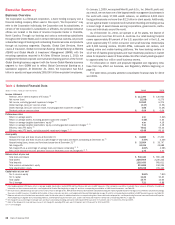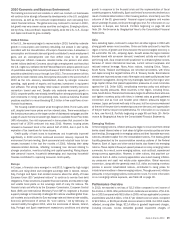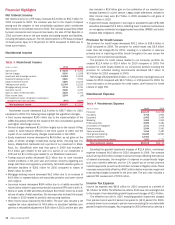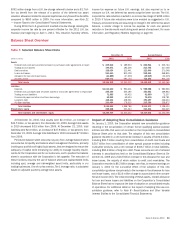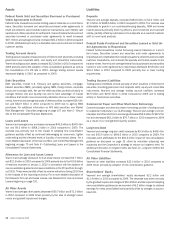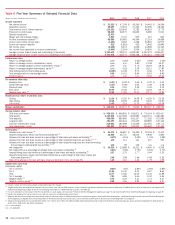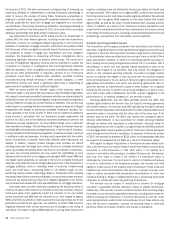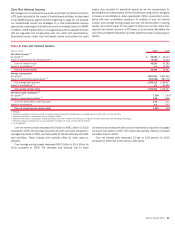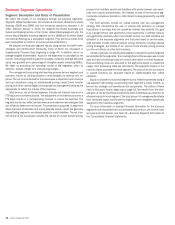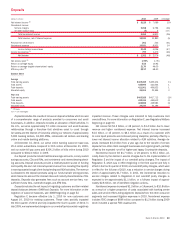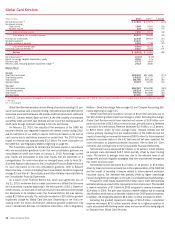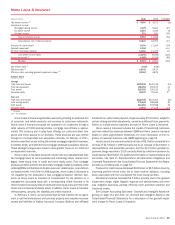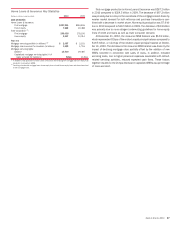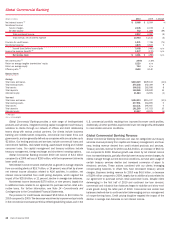Bank of America 2010 Annual Report Download - page 40
Download and view the complete annual report
Please find page 40 of the 2010 Bank of America annual report below. You can navigate through the pages in the report by either clicking on the pages listed below, or by using the keyword search tool below to find specific information within the annual report.first quarter of 2011. We also commenced a rolling process of preparing, as
necessary, affidavits of indebtedness in pending foreclosure proceedings in
order to resume the process of taking these foreclosure proceedings to
judgment in judicial states, beginning with properties believed to be vacant,
and with properties for which the mortgage was originated on a non-owner-
occupied basis. The process of preparing affidavits in pending proceedings is
expected to continue in the first quarter of 2011, and could result in prolonged
adversary proceedings that delay certain foreclosure sales.
Law enforcement authorities in all 50 states and the U.S. Department of
Justice (DOJ) and other federal agencies, including certain bank supervisory
authorities, continue to investigate alleged irregularities in the foreclosure
practices of residential mortgage servicers. Authorities have publicly stated
that the scope of the investigations extends beyond foreclosure documenta-
tion practices to include mortgage loan modification and loss mitigation
practices. The Corporation is cooperating with these investigations and is
dedicating significant resources to address these issues. The current envi-
ronment of heightened regulatory scrutiny has the potential to subject the
Corporation to inquiries or investigations that could significantly adversely
affect its reputation. Such investigations by state and federal authorities, as
well as any other governmental or regulatory scrutiny of our foreclosure
processes, could result in material fines, penalties, equitable remedies
(including requiring default servicing or other process changes), or other
enforcement actions, and result in significant legal costs in responding to
governmental investigations and additional litigation.
While we cannot predict the ultimate impact of the temporary delay in
foreclosure sales, or any issues that may arise as a result of alleged irregularities
with respect to previously completed foreclosure activities, we may be subject to
additional borrower and non-borrower litigation and governmental and regulatory
scrutiny related to our past and current foreclosure activities. This scrutiny may
extend beyond our pending foreclosure matters to issues arising out of alleged
irregularities with respect to previously completed foreclosure activities. Our
costs increased in the fourth quarter of 2010 and we expect that additional
costs incurred in connection with our foreclosure process assessment will
continue into 2011 due to the additional resources necessary to perform the
foreclosure process assessment, to revise affidavit filings and to implement
other operational changes. This will likely result in higher noninterest expense,
including higher servicing costs and legal expenses, in Home Loans & Insurance.
It is also possible that the temporary suspension in foreclosure sales may result
in additional costs and expenses, including costs associated with the mainte-
nance of properties or possible home price declines while foreclosures are
delayed. In addition, required process changes could increase our default
servicing costs over the longer term. Finally, the time to complete foreclosure
sales may increase temporarily, which may result in an increase in nonperform-
ing loans and servicing advances and may impact the collectability of such
advances and the value of our mortgage servicing rights (MSR) asset, MBS and
real estate owned properties. An increase in the time to complete foreclosure
sales also may inflate the amount of highly delinquent loans in the Corporation’s
mortgage statistics, result in increasing levels of consumer nonperforming
loans, and could have a dampening effect on net interest margin as non-
performing assets increase. Accordingly, delays in foreclosure sales, including
any delays beyond those currently anticipated, our continued process enhance-
ments and any issues that may arise out of alleged irregularities in our foreclo-
sure process could increase the costs associated with our mortgage operations.
Loan sales have not been materially impacted by the temporary delay in
foreclosure sales or the review of our foreclosure process. However, delays in
foreclosure sales could negatively impact the valuation of our real estate
owned properties and MBS that are serviced by us. With respect to agency
MBS, while there would be no credit impairment to security holders due to the
guarantee provided by the agencies, the valuation of certain MBS could be
negatively affected under certain scenarios due to changes in the timing of
cash flows. The impact on agency MBS depends on, among other factors, how
long the underlying loans are affected by foreclosure delays and would vary
among securities. With respect to non-agency MBS, under certain scenarios
the timing and amount of cash flows could be negatively affected. The ultimate
impact on the non-agency MBS depends on the same factors that impact
agency MBS, as well as the level of credit enhancement, including subordi-
nation. In addition, as a result of our foreclosure process assessment and
related control enhancements that we have implemented, there may continue
to be delays in foreclosure sales, including a continued backlog of foreclosure
proceedings, and evictions from real estate owned properties.
Certain Servicing-related Issues
The Corporation and its legacy companies have securitized, and continue to
securitize, a significant portion of the residential mortgage loans that we have
originated or acquired. The Corporation services a large portion of the loans it
or its subsidiaries have securitized and also services loans on behalf of third-
party securitization vehicles. In addition to identifying specific servicing cri-
teria, pooling and servicing arrangements entered into in connection with a
securitization or whole loan sale typically impose standards of care on the
servicer, with respect to its activities, that may include the obligation to
adhere to the accepted servicing practices of prudent mortgage lenders
and/or to exercise the degree of care and skill that the servicer employs
when servicing loans for its own account. Many non-agency residential mort-
gage-backed securitizations and whole loan servicing agreements also re-
quire the servicer to indemnify the trustee or other investor for or against
failures by the servicer to perform its servicing obligations or acts or omis-
sions that involve willful malfeasance, bad faith or gross negligence in the
performance of, or reckless disregard of, the servicer’s duties.
Servicing agreements with the GSEs generally provide the GSEs with
broader rights relative to the servicer than are found in servicing agreements
with private investors. For example, each GSE typically has the right to demand
that the servicer repurchase loans that breach the seller’s representations and
warranties made in connection with the initial sale of the loans even if the
servicer was not the seller. The GSEs also reserve the contractual right to
demand indemnification or loan repurchase for certain servicing breaches
although we believe that repurchase or indemnification demands solely for
servicing breaches are rare. In addition, our agreements with the GSEs and their
first mortgage seller/servicer guides provide for timelines to resolve delinquent
loans through workout efforts or liquidation, if necessary. In the fourth quarter
of 2010, we recorded an expense of $230 million for compensatory fees that
we expect to be assessed by the GSEs as a result of foreclosure delays.
With regard to alleged irregularities in foreclosure process-related activ-
ities, a servicer may incur costs or losses if the servicer elects or is required to
re-execute or re-file documents or take other action in its capacity as a
servicer in connection with pending or completed foreclosures. The servicer
also may incur costs or losses if the validity of a foreclosure action is
challenged by a borrower. If a court were to overturn a foreclosure because
of errors or deficiencies in the foreclosure process, the servicer may have
liability to a title insurer of the property sold in foreclosure. These costs and
liabilities may not be reimbursable to the servicer. A servicer may also incur
costs or losses associated with private-label securitizations or other loan
investors relating to delays or alleged deficiencies in processing documents
necessary to comply with state law governing foreclosures.
The servicer may be subject to deductions by insurers for mortgage
insurance or guarantee benefits relating to delays or alleged deficiencies.
Additionally, if the servicer commits a material breach of its servicing obliga-
tions that is not cured within specified timeframes, including those related to
default servicing and foreclosure, it could be terminated as servicer under
servicing agreements under certain circumstances. Any of these actions may
harm the servicer’s reputation, increase its servicing costs or otherwise
adversely affect its financial condition and results of operations.
38 Bank of America 2010


